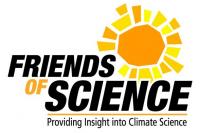Earlier this month, John Cook of Skeptical Science and his team of volunteers at the Consensus Project released the latest definitive study of global warming scientific consensus, revealing that 97 percent of peer-reviewed papers with a clear view on the subject agree that global warming is occurring and that humans are the primary cause.
Ever since, we’ve seen the predictable pushback from fossil fuel industry apologists and climate deniers.
The loudest response comes from the Alberta-based Friends of Science, a shadowy non-profit with a history of Canadian oil company ties, which DeSmogBlog has covered extensively over the years.
Friends of Science Challenge the Cook Study for Bandwagon Fear Mongering on Climate Change and Global Warming
Detailed analysis shows that only 0.5% (65 of the 12,000 abstracts rated) suggest that humans are responsible for more than 50% of the global warming up to 2001, contrary to the alleged 97% consensus amongst scientists in the Cook et al study. Citing fear mongering and faulty methodology Friends of Science reject the study and President Obama’s tweet as careless incitement of a misinformed and frightened public, when in fact the sun is the main driver of climate change; not human activity or carbon dioxide (CO2).
Friends of Science hasn’t responded to DeSmog’s inquiries about their methodology, and how they came up with that 65 paper number. But we do know a lot about Friends of Science’s history and how they’ve long been closely connected to the fossil fuel industry, including tar sands giant Talisman Energy.
Six years ago, the organization came under intense scrutiny and criticism as it was revealed that its largest donor was Talisman Energy, funneling money through a since-shuttered “Science Education Fund” at the University of Calgary in order to work with then APCO flack and Heartland-tied Tom Harris on a disinformation video that was later condemned by the University.
The SourceWatch profile of Friends of Science explains the origins of the organization, as well as its dubious funding, in great depth. Similarly, Canadian journalist Mike de Souza has explored the connections between Alberta oil interests and Friends of Science.
(Also see Richard Littlemore’s post about de Souza’s reporting here on DeSmogBlog.)
For the past half decade, it has proven increasingly difficult to identify the main sources of Friends of Science funding, though their newsletters and website claim that the majority of funds are raised through private donations and supporting memberships.
For what it’s worth, that 65 paper figure is gaining traction in the deniersphere. ClimateDepot links prominently to a similar assessment by Brandon Schollenberger.
The problem with these evaluations is that Schollenberger and Friends of Science (assuming they used the same methodology to get the same number) only count the papers if the abstracts (not the body of the paper) explicitly state that “that human activity is a dominant influence or has caused most of recent climate change.”
Skeptical Science and the Consensus Project were prepared for these types of gripes. From the FAQ of the study:
What is the significance of the papers that express no position on human-caused global warming?
Naomi Oreskes predicted in 2007 that as human-caused global warming became settled science, fewer papers would see the need to explicitly endorse the consensus. For example, no research papers on geography currently need to state that the Earth is round. Our results confirm this prediction: As the field progresses, scientists feel less and less need to waste the valuable real estate of the paper’s abstract with an affirmation of settled science.
Moreover, most of papers that expressed “no position” in the abstract went on to endorse the consensus in the full paper. We determined this by asking scientists to rate the level of endorsement of their own papers – a way of rating the full paper rather than just the abstract. More than half of the papers that were rated as “no position” based on their abstract were self-rated as endorsing the consensus.
And while we’re here, it’s worth taking a closer look at the Consensus Project methodology, especially in terms of how each abstract was rated by 24 volunteers, and many climate scientist authors who self-rated their work.
How did you independently check your results?
Nobody is more qualified to judge a paper’s intent than the actual scientists who authored the paper. To provide an independent measure of the level of consensus, we asked the scientists who authored the climate papers to rate the level of endorsement of their own papers. Among all papers that were self-rated as expressing a position on human-caused warming, 97.2% endorsed the consensus. This result is consistent with our abstract ratings, which found a 97.1% consensus.
We adopted several methodologies to eliminate the potential of bias in our abstract ratings. We developed a strict methodology (see the Supplementary Material for more details) specifying how to categorise each abstract. In addition, each abstract was rated by at least two separate raters, with any conflicts resolved by a third reviewer.
The entire database of 12,464 papers is available in the Supplementary Material. We have also published all our abstract ratings, which are also available via a search form. However, we have not published individual self-ratings from the authors of the papers as the “self-rating survey” was conducted under the promise of confidentiality for all participants.
We have also created an Interactive Rating System, encouraging people to rate the papers themselves and compare their ratings to ours. We welcome criticism of our work and we expect that further scrutiny will improve the reliability of our results. By encourage more interaction, we hope people will come to appreciate the diversity and richness of climate research.
So if you happen to read in some contrarian headline somewhere that “only 65” of the papers in Cook’s 97-percent study really confirmed manmade global warming, consider the source.
Subscribe to our newsletter
Stay up to date with DeSmog news and alerts






